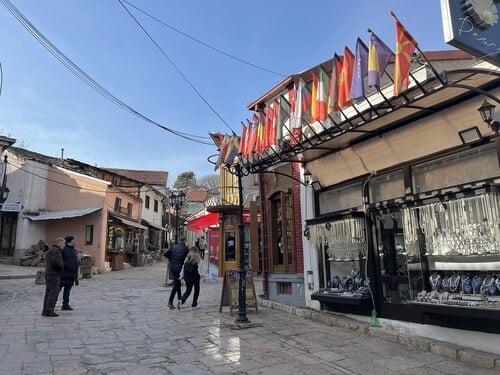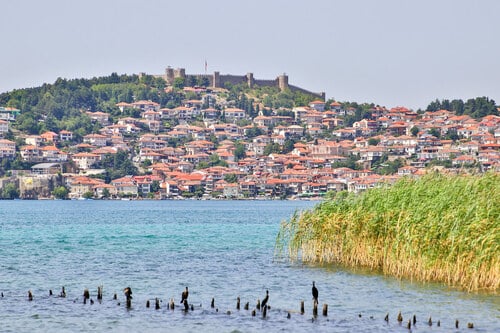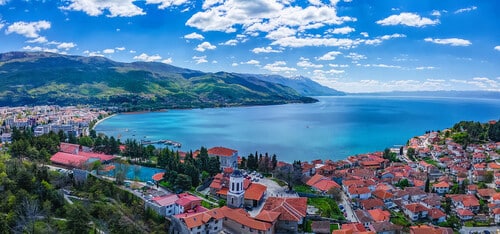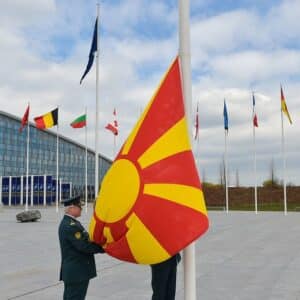Although the North Macedonia Citizenship By Investment Program has been operating for some time, it is likely that you are unaware of it. Read on to know more about this CBI program.
As a result of the lack of marketing efforts made by the government and the fact that North Macedonia is a nation that has been a member of NATO only since March of 2020, the country has not acquired much traction.
Recently, there have been discussions about the possibility of the government restarting its North Macedonia Citizenship By Investment program.
Citizenship-by-investment policies are becoming more popular, particularly among nations that are severely lacking in foreign direct investment and are too dependent on a small number of specific businesses. The residents of these nations need an innovative solution in order to raise their standard of living.
To put it another way, the policy of attaining economic citizenship serves as an incentive for businesses to engage in the various sectors of the nation.
If you want to invest as an expat or high-net-worth individual, which is what I specialize in, you can email me (advice@adamfayed.com) or use WhatsApp (+44-7393-450-837).
What Is A Citizenship By Investment?
Citizenship by Investment, sometimes known as CBI, is an additional path to acquiring one’s country’s citizenship. In return for a monetary contribution to the economy of the nation, people and, in certain situations, their families may be granted dual citizenship via a legal procedure.
This process can be done in exchange for dual citizenship. Through this program, governments are given the opportunity to direct cash earned toward the development of a variety of sectors, including healthcare, education, and infrastructure, among others.

In return, investors get citizenship in the host nation in addition to that of their home nation, assuming that the investor’s home nation recognizes dual citizenship.
There are particular standards that must be met in order to make the investment that you are permitted to make, and there are various perks linked with the citizenship that you gain depending on the nation.
The idea of obtaining citizenship in exchange for financial contributions was first conceived in the Caribbean, and in 1984, Saint Kitts and Nevis became the first countries to implement such a program.
Only a select few nations throughout the globe at this time provide an opportunity to get citizenship in exchange for financial investment; five of such nations are situated in the Caribbean. Countries such as Dominica, Antigua and Barbuda, Saint Lucia, Saint Kitts & Nevis, and Grenada offer their own citizenship by investment programs. Click the links to learn how to get citizenship by investment in each country.
Bulgaria, Austria, Vanuatu, and Turkey are some examples of more nations than Vanuatu that provide a pathway to citizenship by financial investment.
Why Live In North Macedonia?
The Republic of North Macedonia benefits from its location at an important confluence of transportation lines, in particular, the north–south route that extends from the Danube River to the Aegean Sea and the well-known east–west trade routes that link the Black Sea and Istanbul with the Adriatic Sea.
Citizens who were born in the country as well as those who become citizens via investments will be able to participate in the civil law system supported by this pro-Western administration.
Mount Korab, which is located on the border with Albania and has a height of 2,752 meters, is the highest point in the mountainous region of North Macedonia.
Richly forested regions may be found in the northwestern part of the nation, in close proximity to the Ar Mountains. The presence of several fertile valleys makes for an attractive environment for agricultural investment.
In general, the climate of the nation is classified as somewhat continental; nevertheless, the eastern area has a tendency to have winters that are less severe and summers that are hotter and drier than those in the western part.
The people of Macedonia take great pleasure in their language and culture, and the country as a whole has made significant contributions to the preservation of both, not only in the realm of education but also in the realms of theater, cinema, literature, and other creative endeavors.
The food of the region is influenced by various cuisines from the Mediterranean, the Balkans, and Turkey.
Around the middle of the 1990s, Macedonia was successful in luring new commercial partners, which led to the country’s economy beginning to thrive.
Although it suffered a brief drop in gross domestic product at the start of the 21st century, it swiftly made a full recovery. In addition to this, the nation did far better than a great number of other nations did throughout the global economic recession that started in 2008.
Agriculture and international commerce are the two key pillars of North Macedonia’s economy today, with the United Kingdom, Germany, Greece, Italy, Romania, and Serbia serving as the country’s most important trading partners.
Iron and steel, apparel and accessories, and food goods make up the bulk of the country’s overall exports. Astonishingly, the economy is capable of satisfying its own need for the most fundamental goods, including food, coal, and hydroelectric power.
The strategy of the government known as a free economic zone (FEZ) was developed to entice both local and international direct investment.
Since then, more than a dozen free economic zones (FEZs) in various parts of the country have been established as a result of this strategy, which also provides the advantage of a tax vacation lasting ten years.
The country’s low tax rates and free economic zone (FEZ) policies attract international investors, who then contribute to economic growth via FDI.
It is one of the free economies that is most accommodating to investors, and it is ranked in the top 20 nations in the world for how easy it is to do business there.
Should You Consider Applying for Citizenship in the Republic of North Macedonia?
The Republic of Macedonia offers a tax system that is quite beneficial, with a flat 10% tax on business income; but, the country does not have much more to offer. In addition, the rules for entering Macedonia are not entirely transparent.
The possibility exists that they will eventually become members of the European Union. The process of bringing it into the union is now underway.

Due to the fact that it has submitted an application to join the EU, Northern Macedonia has been granted a unique status. But is the potentially high cost of acquiring citizenship in North Macedonia worth it for the chance to join Europe?
Despite the fact that Macedonia has not yet become a member of the EU, its citizens and residents are permitted to travel visa-free to 125 countries, including the Schengen Area as well as the rest of the EU.
It provides all of the advantages of traveling without any of the disadvantages that are connected with becoming a member of the European Union.
Citizens and residents are also able to travel visa-free to a number of other countries, including Japan, Singapore, Colombia, Malaysia, and the Maldives.
Back in the 1990s, there was much discussion regarding Turkey’s potential membership in the European Union (EU). That didn’t happen. As a result of the fact that over the course of the previous two decades, the attractiveness of the EU has also decreased quite a little.
How Strong Is The North Macedonia Passport?
The Guide Passport Ranking Index placed the Macedonian passport in the 46th spot in the year 2022.
The passport grants its holders visa-free entry to 125 countries and the ability to travel to numerous additional countries with a visa on arrival. This indicates that the passport has a mobility score that is somewhere in the middle of the spectrum overall.
Since February of 2019, the country has been referred to by its current name, North Macedonia. Before then, it was known simply as Macedonia, and it was one of the six republics that made up Communist Yugoslavia.
Greece was eager to maintain the name “Macedonia” as part of its own famous past, and the area of Macedonia, which is part of northern Greece, was at the center of the argument over the name. This was primarily owing to the territory’s long and complicated history, which dates back to prehistory.
The controversy over the country’s name was finally settled, and today North Macedonia is a stable, unitary, parliamentary constitutional republic that is a member of the United Nations, NATO, the World Bank, the Council of Europe, BSEC, CEFTA, OSCE, and the World Trade Organization (WTO).
Since 2005, North Macedonia has been a candidate for membership in the European Union (EU), and on July 19, 2022, the beginning of formal discussions for joining the EU formally began.
The European Union has previously provided considerable development assistance to the nation, which has helped to the country’s rising economy and commercial sector.
The Previous North Macedonia Citizenship By Investment Program
The North Macedonia Citizenship By Investment is not a recent development. Even though it has been there for some time, the government has not done a very good job of marketing it.
The administration of the Republic of Northern Macedonia is very dedicated to fostering the growth of the country’s many sectors. Fantastic incentives were provided by the nation as part of an effort to entice investors to make direct investments in the nation’s businesses and factories.
If you had participated in the previous program, the following would have qualified you to apply for citizenship:
- Commit to employing at least 10 residents in the area permanently for a period of at least one year.
- Invested at least 400,000 Euros directly in the construction of new facilities. The required sum to be deposited into the bank account of a regional company serving the community.
- Were physically present at an establishment such as an office, a factory, or a shop.
It was a novel combination of elements that made up a remarkable program.
Why Was The Previous North Macedonia Citizenship By Investment Program Changed?
The procedure that was used for the old citizenship-by-investment program in the Republic of North Macedonia was the primary source of complaints against the program. The administration did not make any effort to simplify the process at all.
The region of Northern Macedonia is often disregarded. Therefore, in point of fact, there have only ever been a small number of individuals who have taken advantage of the country’s offer of immigration. As a direct consequence of this, there was neither a straightforward guide nor a uniform procedure.
The North Macedonia Citizenship By Investment
Since 2016, the Republic of North Macedonia has granted citizenship to non-citizens who invest at least 400,000 euros in local firms on a purely discretionary basis.
The year 2021 saw the curation of a uniform investor naturalization scheme. This included the possibility of investing in a development fund that had been given approval.
This demonstrates that North Macedonia is following in the footsteps of other comparable citizenship investment initiatives in Europe that have been successful.
Despite this, North Macedonia has made further adjustments to its program in order to bring it into greater conformity with EU regulations.
Through the North Macedonia Citizenship by Investment Program, non-residents of the country are given the opportunity to invest in the country and then apply for citizenship as a result of their investment.
Because the program has a restriction for the number of applications it receives each year, only one thousand people may be accepted at any one time.
What Are The New Changes To The North Macedonia Citizenship By Investment?
Under the terms of the new program that is being introduced by Northern Macedonia, you will be required to make an investment of about 200,000 Euros in the nation.
There is a possibility that not all of this sum represents an investment but rather a charge of some kind instead. If you really want to know the answer, you should wait for the formal announcement.
Even though this could be an excellent chance, the fee will be much greater than the one for the Caribbean citizenship by investment scheme, even if the perks would be almost the same.
What Are The Benefits Of North Macedonia Citizenship By Investment
- Visa-free or visa-on-arrival entry to 125 locations
- Citizenship is for people who are 18 years old or older. When both or one of their parents gets citizenship, children under 18 who live with them can apply for citizenship by descent.
- Citizenship can be given to children and grandchildren.
- Access to a trade market that is carefully placed
- Citizenship of an upper-middle-income European country with a nice society and a good tax system
- There is no minimum time spent in a country or language needed to get citizenship.
- Citizenship of a country that just joined NATO and is trying to join the EU
- Access to a highly skilled staff and quick methods for registering a company
How To Apply For North Macedonia Citizenship By Investment
You will need to seek assistance from an expat financial advisor in North Macedonia if you want to apply for citizenship in North Macedonia. An expat advisor will help you with the application forms, the calculation of the proper fees, and all of the evidence that is required to support your application.
Documents such as certificates of birth and marriage, a prospectus that has been signed, share redemption documentation from the fund in which you are investing, certificates of clearance from the police, a résumé or curriculum vitae (CV), as well as evidence or proof of your financing source and financial position, are required.
To summarize, the following actions are required in order to submit an application for North Macedonia Citizenship By Investment:
- Carry out the preliminary inspections required for due diligence.
- Put your signature on the client agreement, and make any necessary payments.
- Your application for citizenship in North Macedonia will be sent to the government as soon as all of the essential conditions have been met.
- Your application ought to be accepted once sometime between three and five months have passed.
- Your contribution, as well as any fees that are still owed, are now due.
- When you have obtained full citizenship, you will be issued a passport and will be entitled to all of the privileges that come along with citizenship in North Macedonia.
What Are The Financial Requirements To Apply For North Macedonia Citizenship By Investment?
The following are the two options that are accessible to investors:
Option 1: An investment of €200,000 (or its equivalent) per adult applicant in a private investment fund, to be retained for a period of at least two years and to be conducted in accordance with the regulations and legislation of the government of the Republic of North Macedonia.
Option 2: A direct investment of €400,000 (or equivalent) per adult applicant in brand-new facilities that employ at least 10 people for a minimum of one year each. It is necessary for the investment to be in accordance with government regulations.
The whole cost of the program, which will set you back €200,000, may be broken down as follows, and that includes all of these fees:
Single applicants are required to pay €250,000, while couples must pay €280,000.
Costs are as follows: €300,000 for a family of three and €310,000 for a family of four
These are just meant to serve as a reference; the total cost may wind up being a little bit more than this, depending on the rates charged by the agency and any adjustments made to the other expenses.
Why Invest In North Macedonia?
The Republic of North Macedonia is an excellent option for extending the commercial network outside the confines of the location where the company’s headquarters are located. Despite its tiny size and relatively unimportant domestic market, the nation has been accorded special status for a number of different reasons.

The following is a list of numerous benefits that may be gained by placing your company activity here:
- The location is ideal geographically, since it is at the intersection of Corridor 8 and Corridor 10;
- policy of liberalized international commerce;
- Because local producers are granted full access to the market in the EU as a result of bilateral agreements, the nation has become extremely competitive in terms of both output and export growth;
- Currency that is stable, inflation rates that are low, and an atmosphere that is financially secure;
- 10% of the rate, which is one of the lowest in the area for the corporate income tax;
- a number of investment zones that provide tax relief for a period of 10 years, including relief from profit tax, personal income tax, value-added tax, and customs taxes;
- The labor force has a high level of education and is very well trained;
- With a monthly wage of around 552 EUR on average, Macedonia has one of the lowest labor expenditures in the area; and
- The nation is both a member of NATO and a candidate to join the European Union.
Easy Process To Start A Company In North Macedonia
The operations of commercial companies are governed by North Macedonia’s Law on Commercial Companies. It outlines the many kinds of businesses, as well as the processes involved in establishing them and running them.
In accordance with the Law, the Central Registry is an authorized entity that is tasked with providing all services regarding registration and keeping the commercial register of all firms updated.
The law recognizes six distinct categories for business organizations, including general partnerships, limited partnerships, joint-stock corporations, limited partnerships by stock, and sole proprietorships.
A company may be established using the One-Stop-Shop system that is provided by Central Register in as little as four hours (in fact, it takes between two and three business days). All of the necessary registration processes with the different governmental agencies are handled by the system.
Companies now have the option of using an electronic registration system that is safe, user-friendly, and quick for completing any and all sorts of registrations required by the Trade Registry and the Registry of other legal organizations.
However, it is essential to highlight the fact that some commercial endeavors functioning in certain industries, such as insurance, banking, education, and pharmaceuticals, are required to get supplementary operating permissions or licenses before they can begin their operations.
Their procedure of registration is followed by a process of licensing with the necessary authorities covering the subject of licenses or permits in their various areas of activity.
The workers of the Central Registry get training to assist newly registered firms and guide them to the proper licensing authorities so that they may obtain licenses.
Expat-Friendly Tax Structures
It is generally agreed that Macedonia’s tax structure is among the most alluring options available in the area. Since a long time ago, the country’s relatively cheap tax rates have been luring businesses from other countries to set up shop here as investors.
A tax structure that is not prohibitively expensive also encourages already profitable enterprises to make additional improvements to their company processes, which in turn boosts their profits. Take a look at a few of the individual tax rates, which are as follows:
- Property Tax Rate: 0.1-0.2%
- SalesTax of Real Estate Rate: 2-4%
- Industrial Products Tax Rate: 3%
- Inheritance and Gift Tax Rate (2nd order of succession: 2-3%; 3rd order of succession and not related to the testator: 4-5%)
- General Average Tax Rate: 5%
- Personal Income Tax Rate: 10%
- Value-added Tax Rate (General: 18%; Preferential: 5%)
It is worth noting that North Macedonia has made double taxation agreements with a number of countries.
Easy Process To Obtain North Macedonia Visa
There are three categories of visas that may be obtained in the Republic of North Macedonia: an entry visa, a business visa, and an employment visa (in addition to North Macedonia Citizenship By Investment). There are also two categories of permits: a work permit and a residence permit.
There are three different categories for entry visas: visas for airport transit (A visa), visas for short stays and transit (C visa), and visas for long stays (D visa).
They are given to non-citizens who want to enter North Macedonia for the purposes of staying there for a short period of time, entering the country for the purposes of staying there for an extended period of time, traversing the territory, or entering an international transit zone inside an airport.
To enter and remain in the nation without a visa is not a need for citizens of countries that are parties to the Schengen Agreement and the European Union. This is an important fact to keep in mind.
The procedure of acquiring the necessary documentation for a visa to gain entry into a country is analogous to that of other nations.
It is mandatory for the non-native individual to file a formal petition for a visa document with the relevant diplomatic or consular agent of North Macedonia within a timeframe of fifteen days to six months prior to the scheduled departure date of their journey.
Upon the issuance of the visa document, the non-citizen is authorized to enter the host nation and stay for the duration specified in the visa document.
With respect to the employment policy for non-native individuals, the domestic legal framework exhibits a proclivity toward facilitating the entry of foreign laborers into the job market.
As per the domestic legislation governing employment and the engagement of foreign nationals, the host country permits foreign employees to enter into employment agreements or engage in other commercial pursuits with either domestic or foreign employers.
The foreign employee is granted a work permit by the government for the aforementioned purpose.
Pained by financial indecision?

Adam is an internationally recognised author on financial matters with over 830million answer views on Quora, a widely sold book on Amazon, and a contributor on Forbes.



